

Pressure for EU net neutrality rules. 13 December 2011Last updated at 11:20 ET Europe could be moving closer towards regulation on net neutrality The European Council of Ministers has called for the principle of net neutrality to become law, adding to pressure on the European Commission to act.
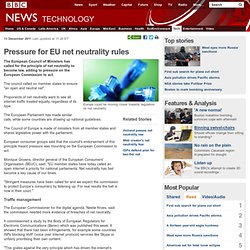
The council called on member states to ensure "an open and neutral net". Proponents of net neutrality want to see all internet traffic treated equally, regardless of its type. The European Parliament has made similar calls, while some countries are drawing up national guidelines. The Council of Europe is made of ministers from all member states and shares legislative power with the parliament. European consumer groups said that the council's endorsement of this principle meant pressure was mounting on the European Commission to act. Monique Goyens, director general of the European Consumers' Organisation (BEUC), said: "EU member states have today called an open internet a priority for national parliaments. Traffic management. European Commission Favors Consumer Choice Over Net Neutrality Legislation. European Commission Vice President Neelie Kroes won't legislate net neutrality for all, but those who want "access to a robust, best-efforts Internet with all the applications they wish" should have the opportunity to buy such a service, she said Tuesday.
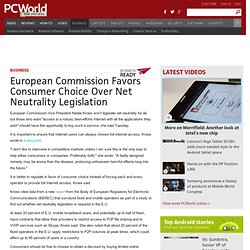
It is important to ensure that Internet users can always choose full internet access, Kroes wrote in a blog post. "I don't like to intervene in competitive markets unless I am sure this is the only way to help either consumers or companies. Preferably both," she wrote. "A badly designed remedy may be worse than the disease, producing unforeseen harmful effects long into the future. " It is better to regulate in favor of consumer choice instead of forcing each and every operator to provide full Internet access, Kroes said. At least 20 percent of E.U. mobile broadband users, and potentially up to half of them, have contracts that allow their providers to restrict access to P2P file sharing and to VOIP services such as Skype, Kroes said.
Dutch pass net neutrality law, block Pirate Bay. Last updated 05:00 12/05/2012 Having passed net neutrality into law yesterday, the Dutch have effectively legislated that there be no restrictions put in place by ISPs (or regulators) on access to the internet.
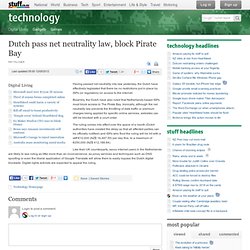
Bizarrely, the Dutch have also ruled that Netherlands based ISPs must block access to The Pirate Bay. Ironically, although the net neutrality law prevents the throttling of data traffic or premium charges being applied for specific online services, websites can still be blocked with a court order. The ruling comes into effect over the space of a month (Dutch authorities have created the delay so that all affected parties can be officially notified) and ISPs who flout the ruling will be hit with a stiff €10,000 (NZ$ 16,487.55) per day fine, to a maximum of €250,000 (NZ$ 412,188.84).
Net neutrality becomes law in The Netherlands. The Netherlands has become the first country in Europe to enshrine the concept of net neutrality in national law.
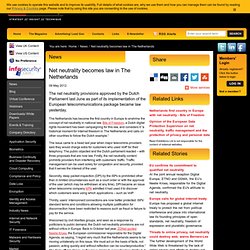
Bits of Freedom, a Dutch digital rights movement has been campaigning for this law, and considers it “a historical moment for internet freedom in The Netherlands and calls on other countries to follow the Dutch example.” The issue came to a head last year when major telecomms providers said they would charge extra for customers who used VoIP for their telephony. The public objected and the Dutch parliament reacted – with three proposals that are now law. Firstly, the net neutrality content prohibits providers from interfering with customers’ traffic. Traffic management can be used solely for congestion and security, provided that it serves the interest of the user.
Secondly, deep packet inspection (DPI) by the ISPs is prohibited other than in limited circumstances such as a court order or with the approval of the user (which may be withdrawn at any time). Pressure for EU net neutrality rules. European Commission Favors Consumer Choice Over Net Neutrality Legislation. United Nations report: Internet access is a human right. Internet access is a human right, according to a United Nations report released on Friday.
"Given that the Internet has become an indispensable tool for realizing a range of human rights, combating inequality, and accelerating development and human progress, ensuring universal access to the Internet should be a priority for all states," said the report from Frank La Rue, a special rapporteur to the United Nations, who wrote the document "on the promotion and protection of the right to freedom of opinion and expression. " La Rue said in his report that access to the Internet is particularly important during times of political unrest, as demonstrated by the recent "Arab Spring" uprisings in Tunisia and Egypt, among other countries. EU decides against stricter net neutrality rules. Commissioner Neelie Kroes said she will look out for instances of ISPs blocking or throttling access to services such as Skype.
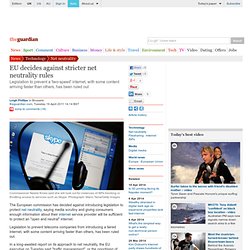
Photograph: Mario Tama/Getty Images The European commission has decided against introducing legislation to protect net neutrality, saying media scrutiny and giving consumers enough information about their internet service provider will be sufficient to protect an "open and neutral" internet. Legislation to prevent telecoms companies from introducing a tiered internet, with some content arriving faster than others, has been ruled out. In a long-awaited report on its approach to net neutrality, the EU executive on Tuesday said "traffic management", or the prioritising of some packets of information over others, "is necessary to ensure the smooth flow of internet traffic, particularly at times when networks become congested".